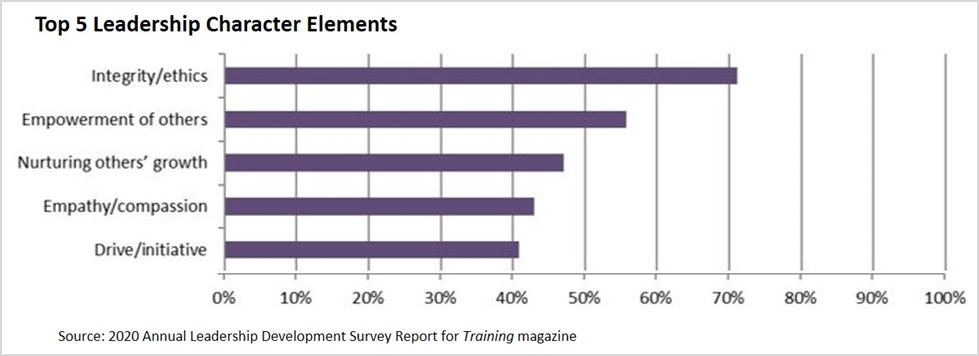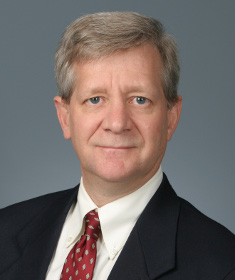Here’s a thought about mid-level leadership development
(August 13, 2020)

Given the increasing pressures and dynamics of today’s business environment, a more intense spotlight is being placed on the role of mid-level leaders as a key driver for organizational sustainability and success.
The focus of the second edition of “Here’s a Thought About . . .” is to shed some light on the top challenges HR leaders are experiencing today with enhancing the effectiveness of mid-level leaders and to offer our thoughts on developing vital, vibrant mid-level leadership skills and character.
While successful development of mid-level leaders is seen as a high priority, performance is another story. Research by Wilson Learning Worldwide and Training magazine shows that only 54% of organizations think their development efforts are effective—and only 12% see them as highly effective.

Performance of Mid-Level Leadership Development Lags
Training magazine and Wilson Learning Worldwide Leadership Survey Report, 2019
Why such a struggle? Our research shows that mid-level leadership is a critical transition point. First-level leaders’ success is primarily driven by their tactical leadership skills—their ability to get work done through other people. However, mid-level leadership is a transition toward a leadership character-dominated success story.
The Struggle in Heroic Management
While first-level leaders struggle to rely less on their functional credibility in order to establish their leadership credibility, mid-level leaders need to shift their focus from getting work done through others toward getting work done with others in a way that grows their ability to do it themselves. There is an underlying human tendency that leaders struggle with—once they are in a position of power with a greater span of control and authority as a mid-level manager, it can be hard to give that up and empower others.
Many mid-level leaders believe that since they are accountable for results—getting the job done right—they need to take charge, assign tasks, coordinate work, control the budget, and make all key decisions, using the one-to-one skills that worked at the first-level leadership position. On one hand, this sounds pretty desirable, doesn’t it? A real take-charge leader.
We refer to this take-charge approach as heroic management. The leader views his or her purpose as achieving specific, short-term business objectives by getting the work done through people. The heroic manager feels he or she must have all the answers, be in control, be responsible for results and coordination, and control everything. As you can imagine, direct reports on the receiving end of this management style feel disempowered, devalued, demotivated, or simply comply, at best.
Mid-level leaders must move beyond the heroic manager approach and shift their mind-set from “getting work done through people” to “getting the work done with people in a way that builds their ability to do it themselves.”
Leadership Growth Skills
While first-level leadership development requires acquisition and mastery of one-to-one survival skills, mid-level leadership development necessitates more one-to-group, or team development, skills.
At Wilson Learning, we have coined these as Leadership Growth Skills—skills that help others grow their own skills and abilities, help the group or department grow their collective capacities and responsibilities, and, ultimately, sustain and grow organizational capacity and agility.
Leadership Growth Skills
- Providing direction through mission and vision
- Establishing mutual influence relationships
- Facilitating team goal-setting
- Fostering shared responsibility
- Facilitating team problem-solving
- Developing cross-functional collaboration
Leadership Character Development
If mastery of Leadership Growth Skills is what effective mid-level leaders achieve, developing strong Leadership Character is the intentionality behind executing growth skills with teams and individuals. It is “the why I lead” and reflects a leader’s personal leadership philosophy, what the leader values, and what the leader believes about leadership. Leadership Character that demonstrates a strong code of morality—integrity and ethics—is powerful, and it is palpable.
Consider data from the 2020 Leadership Development Survey Wilson Learning conducted with Training magazine. When we asked participants to indicate the top five character elements important to their organization, over 50 percent indicated that Integrity/Ethics and Empowerment of Others were the two most critical character elements.

Interestingly, three of the top four elements—Empowerment of Others, Nurturing Others’ Growth, and Empathy/Compassion—all address how leaders need to help others grow and develop. Clearly, a critical element of Leadership Character development is the degree to which leaders show concern for the growth and fulfilment of their employees, as well as the integrity of their own actions and decisions.
Here’s a Thought About . . .
Truly effective mid-level leaders have come to understand that their effectiveness as leaders is enhanced by empowering others to grow, develop, and perform. They understand that the truest source of control comes from freeing others to use their talents—and true leaders put into practice and understand that the best way to keep people energized and performing with fulfilment is to serve, guide, and support.








 Please complete this form to agree to receive ongoing information via email from Wilson Learning.
Please complete this form to agree to receive ongoing information via email from Wilson Learning.






